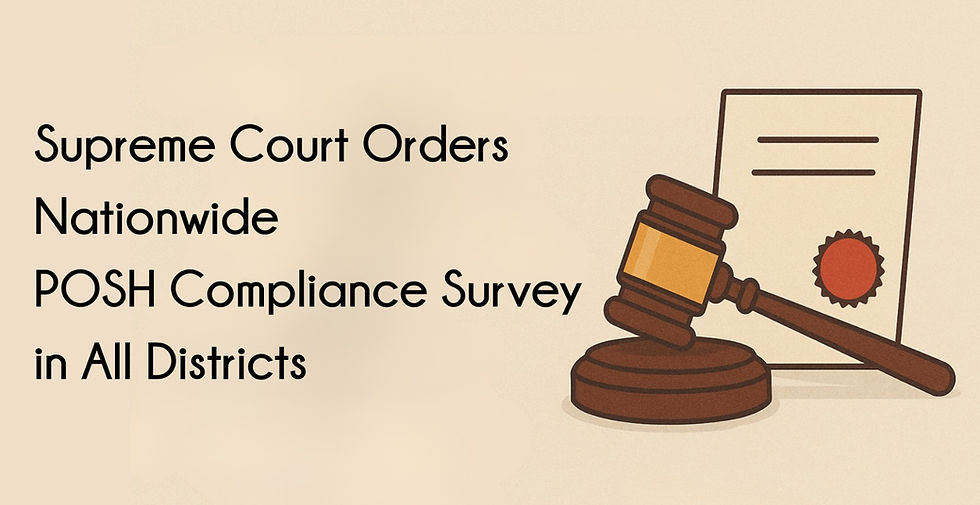The Pitfalls of HR-Led POSH Sensitization Without Subject Knowledge
- LexPOSH

- Jun 24, 2025
- 3 min read

In many organizations, Human Resources (HR) departments play a crucial role in onboarding new employees, introducing them to company policies, workplace culture and essential compliance measures. However, when it comes to conducting Prevention of Sexual Harassment (POSH) sensitization programs, HR professionals often find themselves leading sessions without adequate subject matter expertise. This can have serious implications for both employees and the organization as a whole.
The Risks of Ill-Informed POSH Sensitization
Misinformation and Misinterpretation: Without in-depth knowledge, HR professionals may inadvertently spread misinformation or fail to address key nuances of the POSH Act. For instance, explaining the definition of sexual harassment incorrectly or omitting crucial legal aspects can lead to confusion and improper handling of complaints.
Lack of Credibility: Employees expect POSH sensitization to be conducted by experts who understand the legal, psychological, and workplace dynamics of harassment. If HR facilitators are unable to answer questions effectively or provide vague, surface-level explanations, new joiners may lose trust in the program’s validity and disengage from the learning process.
Unintended Biases and Stereotypes: Sensitization programs are designed to create awareness and eliminate biases, but ironically, they can reinforce them if led by individuals with limited understanding of workplace harassment. Unconscious biases may seep into training, leading to an oversimplified or one-sided perspective on gender and power dynamics.
Failure to Address Real Employee Concerns: New employees may bring real-world concerns and experiences that require nuanced responses. Without expertise, HR professionals may downplay issues, provide incorrect guidance, or fail to create a safe space for open discussions.
Non-Compliance with Legal Requirements: The POSH Act mandates proper sensitization and training for employees. Conducting inadequate or misleading sessions not only puts employees at risk but also exposes the organization to legal liabilities and reputational damage.
Best Practices for Effective POSH Sensitization
To ensure meaningful and legally compliant POSH sensitization programs, organizations should consider the following approaches:
Engage Certified POSH Experts: Partnering with external POSH consultants or trained internal specialists can bring credibility and depth to the sessions. Experts with legal and practical knowledge can ensure accurate and effective training.
Invest in HR Training on POSH: HR professionals should receive specialized training on the POSH Act before conducting sensitization programs. This ensures they have a solid grasp of legal provisions, case laws and best practices for handling complaints.
Use Interactive and Case-Based Learning Methods: Rather than relying solely on PowerPoint slides, organizations should incorporate real-life case studies, role-playing exercises and anonymous reporting simulations to make sessions engaging and informative.
Implement eModules for Induction Training: To ensure consistency and accuracy in POSH sensitization, organizations can introduce eModules as part of the induction process for new joiners. eModules provide standardized, well-structured content that covers the legal framework, reporting mechanisms, and behavioral expectations. This approach allows employees to learn at their own pace while ensuring compliance with the POSH Act.
Encourage Open Dialogue and Continuous Awareness: POSH sensitization should not be a one-time event but an ongoing conversation. Organizations should foster an environment where employees feel safe discussing concerns and seeking clarifications beyond the onboarding phase.
Seek Feedback and Improve Training: Gathering feedback from new joiners about the effectiveness of POSH sensitization programs can help HR refine content and delivery methods. Continuous improvement ensures that training remains relevant and impactful.
Conclusion
While HR plays an important role in onboarding and workplace training, leading POSH sensitization programs without the necessary expertise can do more harm than good. Organizations must recognize the importance of equipping HR teams with the right knowledge or seeking external expertise to ensure that sensitization efforts are legally compliant, informative, and effective. By incorporating eModules into induction training and taking a structured approach, businesses can foster a safer, more inclusive, and legally protected workplace environment for all employees.




